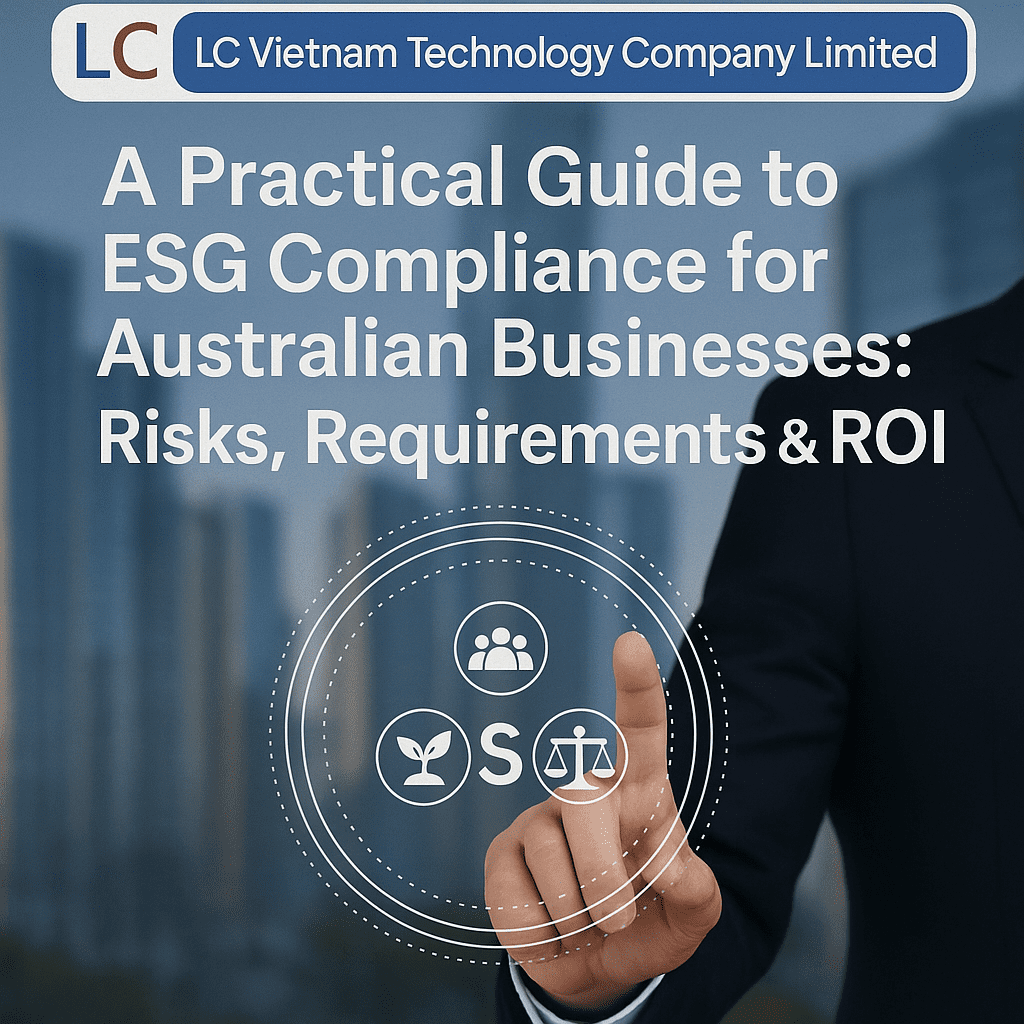In recent years, Environmental, Social, and Governance (ESG) compliance has shifted from being a corporate buzzword to a business imperative—especially for Australian businesses seeking sustainable growth, investor confidence, and long-term resilience. Whether you're a manufacturer, supplier, or corporate entity in Australia, aligning with ESG standards isn’t just about ethical operations—it’s now a competitive necessity.
This practical guide outlines the key risks of ignoring ESG compliance, the core requirements for Australian businesses (especially in the manufacturing sector), and how ESG can drive measurable returns on investment (ROI).
What is ESG and Why It Matters in Australia?
ESG ESG refers to a set of standards for a company’s operations that socially conscious investors use to screen potential investments.
- Environmental: How a business affects the natural environment (e.g. emissions, waste, energy efficiency).
- Social : How it manages relationships with employees, suppliers, customers, and communities.
- Governance: How it operates with transparency, ethics, and accountability.
In Australia, ESG has become increasingly important due to rising regulatory pressure, investor expectations, and consumer demand for ethical and transparent business practices. Australia’s Modern Slavery Act, mandatory climate risk reporting, and net-zero targets are clear indicators that ESG is here to stay.
The Risks of Non-Compliance
Failing to meet ESG standards in Australia can expose businesses—especially those in manufacturing and supply chains—to serious consequences:
-
Regulatory Penalties
The Australian government is strengthening ESG-related regulations. Non-compliance with laws such as the Modern Slavery Act or environmental reporting obligations can lead to legal fines and public scrutiny.
-
Reputational Damage
In an age of social media and instant information, poor ESG practices can quickly tarnish a brand. Consumers are increasingly supporting businesses that align with their values.
-
Loss of Business Opportunities
Larger corporations and global partners are demanding ESG transparency from their suppliers. Without clear factory compliance and ESG documentation, businesses may be excluded from lucrative contracts.
-
Difficulty Attracting Investment
Investors are now using ESG ratings to guide decisions. Poor ESG performance could limit your access to funding or lead to higher capital costs.
Key ESG Compliance Requirements for Australian Businesses
While ESG compliance can vary by industry, here are essential steps every business—especially manufacturers and suppliers—should take:
-
Conduct ESG Risk Assessments
Start by identifying ESG-related risks in your operations. For factories, this might include emissions, energy usage, labor conditions, and waste management. Mapping these risks helps prioritize areas for improvement.
-
Establish ESG Policies and Frameworks
Document policies covering areas like sustainability, ethical sourcing, labor rights, and governance. Make sure they are aligned with Australian laws and international frameworks such as the UN Global Compact or GRI Standards.
-
Ensure Factory Compliance
Factory compliance is a cornerstone of ESG in Australia. This includes meeting health and safety standards, fair labor practices, and environmental regulations. Regular audits and third-party assessments are essential.
-
Implement Monitoring and Reporting Systems
Set up systems to collect ESG data. This may include energy usage reports, employee wellbeing surveys, or board diversity metrics. Transparency and regular reporting are critical to building trust.
-
Engage Stakeholders
Consult with employees, suppliers, investors, and community members. Their feedback will help shape an effective and inclusive ESG strategy.
The ROI of ESG: Why It Pays Off
Contrary to the belief that ESG is only a cost, many Australian businesses are discovering its significant financial benefits. Here’s how ESG compliance can offer a measurable ROI:
-
Operational Efficiency
Improved energy use, waste reduction, and streamlined processes often lead to lower costs. For instance, investing in clean energy for your factory can reduce power bills in the long term.
-
Brand Value and Customer Loyalty
Consumers are drawn to brands that demonstrate responsibility. An ESG-compliant business stands out in a competitive market and can command higher customer loyalty and retention.
-
Investor Attraction
ESG-aligned businesses tend to be more resilient, which is attractive to investors. Many Australian investment firms now prioritize companies with strong ESG practices in their portfolios.
-
Risk Reduction
Better governance, compliance, and stakeholder engagement reduce the risk of lawsuits, disruptions, and reputational crises—ultimately protecting your bottom line.
ESG Compliance in Action: A Manufacturing Example
Let’s say you operate a mid-sized manufacturing facility in Victoria. You begin by conducting an ESG audit that identifies high water consumption and a lack of formal worker safety training.
You invest in water recycling systems and launch a monthly safety workshop. Within 12 months:
- Your water bill drops by 30%
- Workplace incidents reduce significantly
- You gain a contract with a multinational client requiring ESG-certified suppliers
What is The return?
Improved profitability, a stronger reputation, and long-term operational sustainability—all through ESG compliance.
Conclusion: ESG is the Future of Business in Australia
Whether you're just starting your ESG journey or refining existing practices, one thing is clear: ESG compliance is no longer optional. From factory compliance to transparent reporting, Australian businesses must act now to stay relevant, competitive, and responsible.
Start small if needed—but start today. The risks of inaction are too high, and the ROI of getting it right is too good to ignore.




